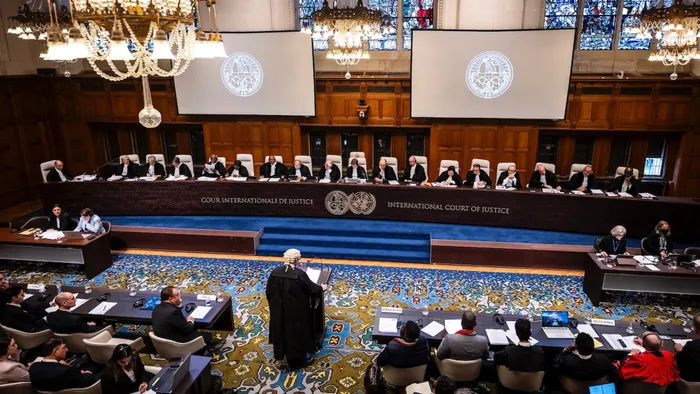Despite Trump’s influence, South Africa remains resolute on Israel genocide case

The International Court of Justice (ICJ) is waiting for Israel to file its court papers to challenge South Africa's case against them
Image: UN Photo/ICJ-CIJ/Frank van Beek
The South African government has confirmed that it will not back down on its International Court of Justice (ICJ) case against Israel, despite concern from some senior ANC officials that President Cyril Ramaphosa was considering withdrawing the case after the meeting with US President Donald Trump.
The case, which accuses Israel of genocide in Gaza, has generated significant international interest and support and has been thrust back into the spotlight after concerns were raised by ANC senior members that Ramaphosa was considering doing a U-turn on government's stance on Israel.
Ramaphosa said the ICJ matter was not discussed in the bilateral meeting but some National Executive Committee (NEC) officials of the ANC remain concerned that Trump may have twisted Ramaphosa’s arm on the matter, especially in relation to trade between the two countries.
US secretary State Marco Rubio has stated Trump will be more open to restoring ties with South Africa if South Africa reconsidered its stance on Israel.
Presidency spokesperson, Vincent Magwenya, on Monday said the government's position on the matter remains unchanged.
"The position of the government and that of the president remains the same on the matter. It cannot be withdrawn and withdrawing is not even an option," Magwenya said in reference to the ICJ case.
Department of International Relations and Cooperation spokesperson Chrispin Phiri echoed Magwenya's response, stating that the matter is before the court and the court has set a deadline for Israel to file its response.
An ANC NEC member said they were concerned about the pressure being exerted on the country, especially its views on international conflict and diplomacy.
"There is concern among us that behind closed doors, the president might have conceded to Trump in order to fix relations. Comrades are not happy with the matter because it would mean we would be throwing Palestine and its people to the wolves," one NEC source said.
Another NEC member said although there was concern that Ramaphosa might fold, he would not make that decision on his own.
ANC spokesperson Mahlengi-Bhengu-Motsiri did not respond to a request for comment.
South Africa filed its Memorial to the ICJ in October, applying for the Convention on the Prevention and Punishment of the Crime of Genocide in the Gaza Strip.
The filing contains evidence of Israel's alleged violations of the genocide convention, including promoting the destruction of Palestinians living in Gaza, physically killing them, depriving them of humanitarian assistance, and ignoring provisional measures of the ICJ.
Political analyst Dr Metji Makgoba said South Africa's decision to take Israel to the ICJ is driven by human rights and solidarity with the Palestinian people.
"South Africa has taken Israel to the International Criminal Court based on principled and political reasons. They were showing solidarity with the Palestinian people, but the decision is principled and is driven by human rights," Makgoba said.
He added that some Western imperialists were not happy with South Africa’s decision to take Israel to the ICJ, however, South Africa’s withdrawal would show that it is being controlled by the US.
Another analyst, Professor Ntsikelelo Breakfast, suggested that Ramaphosa might be tempted to withdraw the case due to pressure from Western powers.
"Behind closed doors, there were issues that were discussed so that South Africa backs down...for example, they had to amend newly issued policy directives aimed at easing Broad-Based Black Economic Empowerment (B-BBEE) requirements for licensing satellite services, including Elon Musk's Starlink," Breakfast said.
Cape Argus
